On February 14, 1984, or 39 years ago this week, the mighty Toyota basketball team formally disbanded by selling their players to Basic Shareholdings, Inc., a Lucio Tan company. The news of their demise created shock waves all over the country and put tears on the faces of millions of Toyota fans.
At the time of their disbandment, Toyota formed one half of what perhaps is the greatest rivalry in Philippine basketball, the other half being the Crispa Redmanizers. Two weeks ago, The Rivalry came up with a feature on the Redmanizers’ disbandment which happened in 1985. This week, The Rivalry looks back and details the highlights and sidelights of what was then described as a St. Valentine’s Day Massacre.
Circulating rumors
Toyota’s performance in the 1983 season was their most dismal in their nine-season history in the league. Rumors of internal turmoil were hampering the team’s performance, and for the first time they failed to go past the elimination round in the third conference, ending up second to the last in the standings. Not once did the Silver Coronas make it to the finals in all three conferences of their final season in the PBA.
At the start of the year, the late Beth Celis had been coming up with “reports from a highly-reliable source” of Toyota’s impending disbandment. Team manager Jack Rodriguez denied the yarn several times, claiming that the team was already in the middle of their preparation for the 1984 season which was to start on March 25. “I don’t know where the story came from, but if there’s one man who can disband this team, that’s (owner) Don Ricardo Silverio, Sr. and he’s out of the country,” assured Rodriguez.
However, Celis, through her source, disputed this and even claimed that it was Rodriguez himself who recommended the disbandment to management. The source even countered Rodriguez’s denial, saying, “Let him deny it, the inevitable will come. Just wait and see.”
Meeting with management
On January 26, in the heat of the first set of articles that came out from Celis, management met with the players, and Rodriguez told the players that management has no plan of disbanding the team, adding that “Silverio, Sr. had pledged one million pesos to continue operations. Noted Toyota supporter and millionaire Bill Warne, who also dabbled a few times in PBA broadcasting through Vintage Enterprises, was also said to have pledged another million, the total being more than enough to sustain the annual team expenses. The assurance provided a sense of relief among the players, worried about losing their jobs if the rumor was true.
It turned out that Rodriguez was working behind the scenes looking for potential buyers. The name of then presidential son-in-law Greggy Araneta, husband of Irene Marcos, came out and was reported to be one of the buyers. Eventually, it turned out that the most interested camp was the Lucio Tan Group, who, only two years ago, formed Asia Brewery, Inc., a diversified beverage company designed to compete against the monopoly rule of San Miguel Corporation. Their flagship brand was Beer Hausen Pale Pilsen, and management needed an advertising vehicle to showcase their beer brand. After conducting a thorough market research, it was deemed that the PBA would be one of the ideal advertising vehicles for the brand.
- Spiking popularity: Comparing volleyball’s following in the Philippines and the US
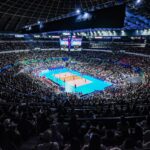
- Cool sweep: How Creamline’s winning formula led to a 7th PVL crown
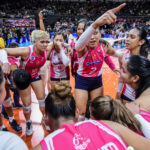
- Pampanga Dragons celebrate 25th anniversary of MBA championship
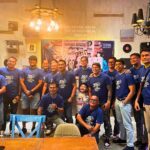
- NBA app launches personalization features, live game experience

- Dante Silverio celebrates 86th birthday in style
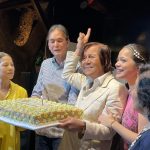
The announcement
It was shortly before noon of February 15, 1984 when Rodriguez called for a team meeting at his Makati office. Ten players showed up – Sonny Jaworski, Ramon Fernandez, Arnie Tuadles, Ed Cordero, Emer Legaspi, Tim Coloso, Pol Herrera, Chito Loyzaga, Nic Bulaong, and Ricky Relosa. Only Francis Arnaiz failed to attend while Abe King had already moved to Beer Hausen’s rival, Gold Eagle Beer of the San Miguel group. The ten had no inkling of what was to be discussed, and some even thought that the meeting was about their Guam trip in March.
Rodriguez started by speaking on behalf of management, expressing their debt of gratitude to the players. “Your achievements have brought honor to the company. The feats that made Toyota one of the great basketball teams in the land made us all very happy and proud of you all.”
When someone asked, “What’s this?”, Rodriguez delivered a cold blow: “The team has just been sold….to Beer Hausen.”
A discussion ensued after and emotions were high. Jaworski felt betrayed, citing “his 12 years with the company and asking for a sense of decency, dignity and respect.” Rodriguez replied that “All of you have been sold, and the new owners of your contracts would want to meet you later this afternoon.”
Meanwhile, Arnaiz learned of the news only the next day in the newspapers. “I was shocked,” said Mr. Clutch. “I thought everything was fine with the team. But here it was. I woke up in the morning and saw the papers screaming with headlines that I had been sold. Hell! I can’t believe it!”
Contracts, not franchise, were sold
Ultimately, the sale had to be consummated. Rodriguez apologized to the media for denying the rumor, citing management’s concern that the negotiations with Asia Brewery would be jeopardized if the news is leaked out. Rodriguez added that he didn’t lie to the players in their January 26 meeting, clarifying that the order to sell came on February 3 from top management.
Curiously, it wasn’t Toyota’s PBA franchise that was sold. Instead, it was the players’ contracts that were bought by Asia Brewery, who in turn, secured a PBA franchise. Previous transactions in the PBA normally involved the sale of the entire franchise, with the players’ contracts being part of the sale. In this case, Toyota didn’t want to sell the franchise as they were hoping to return to the league. As such, it was only the players’ contracts that were sold. This perhaps may have been the reason why Jaworski and Arnaiz were up in arms with the transaction as they felt, “if there was anyone who was going to sell them to a new team, it should be the players themselves.”
There was no information if Basic Shareholdings had already secured a PBA franchise prior to the contracts’ sale. If not, the PBA would not have honored the transaction given that the Lucio Tan company was still not part of the league. But it was very clear that Beer Hausen wanted to have Ramon Fernandez as the cornerstone of the team – their franchise player. Fernandez, who won his first of four MVP titles in 1982, was already widely recognized as the best player of the PBA that time.
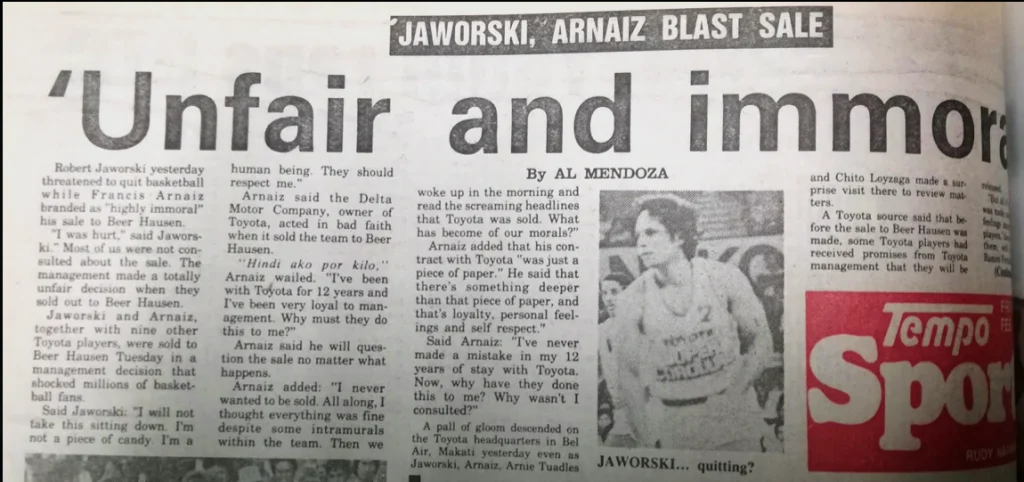
PR war
The next few days saw increased hostilities among the warring camps. Fernandez had accepted the sale and convinced his teammates to honor the transaction so they could play for Beer Hausen. Curiously, in previous interviews with writer Gus Villanueva, Fernandez said that if he was to be traded, the only team he wanted to play for was San Miguel. It came as a surprise to many that El Presidente would now be donning the jersey of SMC’s top corporate rival.
True enough, six other players decided to join Fernandez with the Brewmasters. They were Relosa, Legaspi, Cordero, Herrera, Bulaong and Coloso. Loyzaga and Tuadles eventually joined Great Taste Coffee, King moved to Gold Eagle, while Jaworski and Arnaiz were in limbo, not wanting to honor the transaction.
Julie Yap-Daza’s talk show, “Tell the People” invited the protagonists to discuss the events. Jaworski and Arnaiz sat on one side, while Fernandez and Rodriguez on the other. Accusations were thrown at Rodriguez’s way as he was cast as the villain and the man responsible for the team’s demise. The PBA’s dynamic duo aired their gripes in public, accusing Rodriguez of acting in bad faith without informing the players. Rodriguez reacted, saying that “majority of the players knew all along that negotiations for the team’s sale were ongoing.” Unfortunately, this didn’t jive with Jaworski and Arnaiz’s claim that they have no knowledge of the deal.
Honeyboy to the rescue
With the feuding parties taking their act all over media, it was a war that the PBA wanted to avoid as the league’s credibility was at stake. Jaworski and Arnaiz remained without a team, with the Big J intimating retirement – a prospect that the league didn’t want to happen given his massive popularity.
Then PBA President Carlos “Honeyboy” Palanca, III, team owner of the La Tondeña-owned Gilbey’s Gin, decided to settle the matter. He met with the two and offered them roster spots at Gilbey’s. At that time, the Gin Tonics were considered one of the up-and-coming teams in the league, having placed runner-up twice already – the first time in the 1982 Open Conference as they were bannered by prolific imports Larry McNeil and Sweet Lou Massey, losing to Toyota, and in the succeeding 1983 All Filipino Conference, this time losing to Crispa, both via sweep.
Palanca’s noble act may perhaps be one of the greatest breakthrough decisions ever made in the league’s history. Had Palanca not acted on this, both players would have retired. But when Palanca made this move, it not only brought the team success in the basketball front, it also established his Ginebra squad as perhaps the most popular ballclub ever in Philippine basketball history. Obviously, it was the Jaworski factor that made this possible.
Of course, it was only in 1985 when the Big J took over the coaching reins of Ginebra, as he and Arnaiz solidified Gilbey’s backcourt the year before, playing alongside 1980 Rookie of the Year Willie Generalao, former APCOR skipper Alex Clariño and sweet shooting Joseph Herrera under the mentorship of Turo Valenzona. Gilbey’s went on to return to the Finals of the All Filipino Conference, losing to eventual champions, Crispa, 4-1.
Meanwhile, Beer Hausen ended up fourth place in their maiden conference as Fernandez rampaged his way to what turned out to be a fiery season. He then led the team to a second-place finish in the Second All Filipino conference and third in the Invitationals. Fernandez, now acclaimed as The Franchise, went on to average 27.8 points, 11.17 rebounds and 9.92 assists, just 5 assists away from a phenomenal season triple double. He also had 2.09 blocks and 1.53 steals a game while playing 64 times that year. He also shot 52.54% from the field and 80.83% from the free throw line with a single game high of 46 points.
Aftermath
When the dust was settled and Toyota was gently laid to rest, the PBA tried to keep a semblance of normalcy in the wake of the disbandment. Losing one of the two most popular teams in the league wasn’t easy, but the PBA had to attend to the worsening economy that the country was undergoing. High prices, political turmoil caused by the assassination of former Senator Benigno Aquino, Jr., the spiraling peso-dollar exchange rate, and various exposes on the illegally-acquired Marcos’ wealth caused a major dent in the country’s economy, leading to a negative GDP growth. The PBA wasn’t spared and it was apparent that penny-pinching was the only option.
As such, the PBA had to do away with one of the import-laced conferences and instead, hold two All Filipino Conferences. The Board of Governors then decided late in the second conference to finally hold an Invitational conference, allowing each team to field in one import no taller than 6’5. This was also the shortest tournament that year, good for exactly one month only, to minimize import payroll costs which were to be paid in dollars.
More than this, though, a new rivalry emerged, particularly when Crispa disbanded prior to the 1985 season. That rivalry, though, didn’t feature two teams. Instead, it showcased two larger-than-life individuals, with contrastingly different personalities, but undoubtedly the two with the greatest impact to the league’s shaping of history. A bitter feud ensued between Toyota alpha males Robert Jaworski and Ramon Fernandez, and their much-publicized animosity for each other was clearly evident when they played against one another. It was not only riveting, but it may have also saved the PBA from folding up – as the two collaborated and carried the league during its most difficult times – quite unexpectedly, during the period when they were apart from one another.
But that’s another story altogether.
